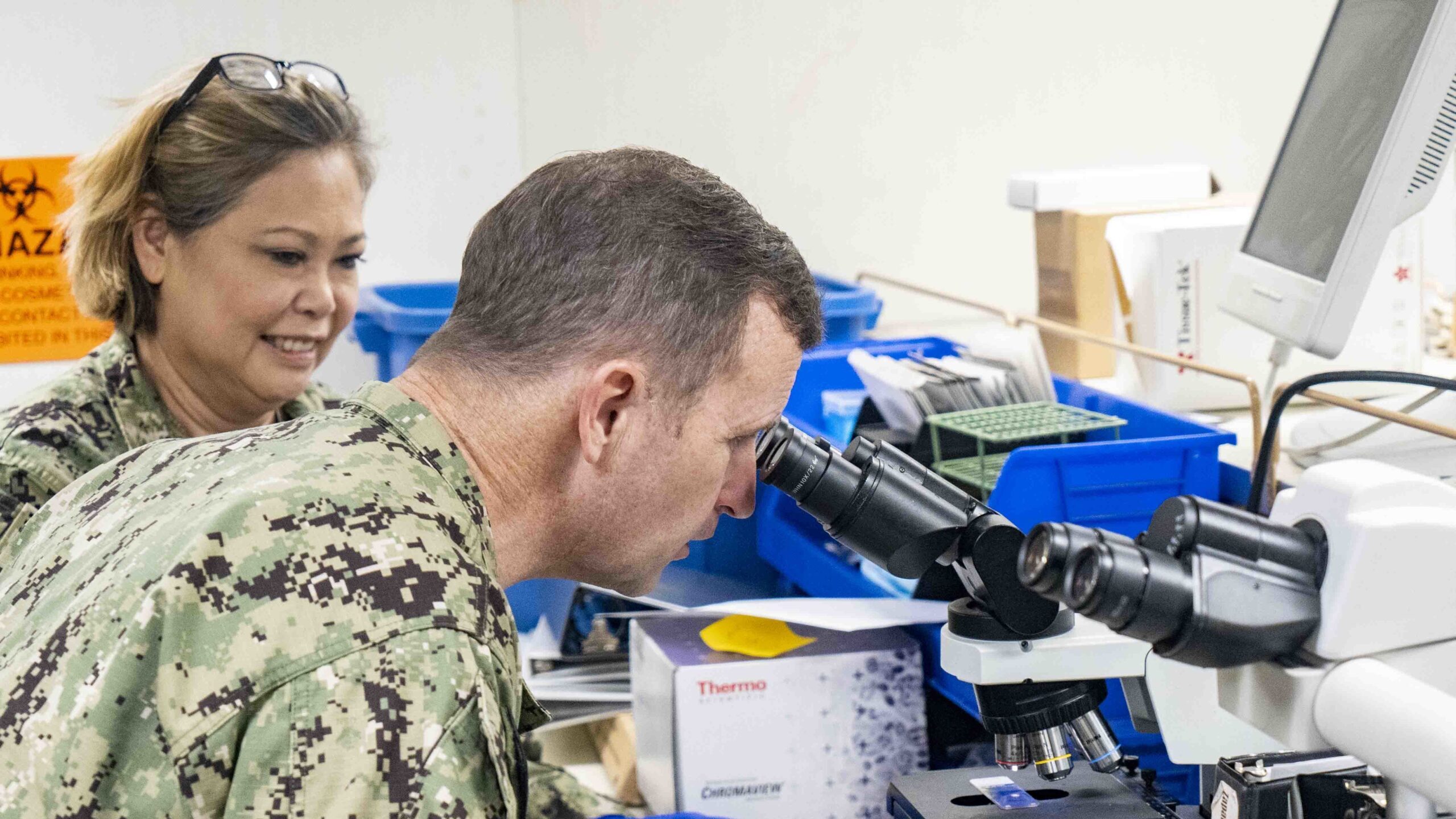
Rear Adm. Mark Melson, Commander, Task Force 73 (CTF 73), uses a microscope to examine a tissue sample as Cmdr. Maria Ramos, left, assists during a tour aboard Military Sealift Command hospital ship USNS Mercy (T-AH 19). (U.S. Navy Brandon Parker)
BARCELONA — The Pentagon today announced $1.2 billion in new investments into biomanufacturing, which it hopes will help lessen the impact of supply chain squeezes and “enhance” everything from hypersonic weapons to submarines.
“The Department recognizes biotechnology as a Critical Technology Area that will change the way the DoD develops new capabilities, conducts missions, and adapts to major global changes,” Heidi Shyu, undersecretary of defense for research and engineering, said in a Defense Department release.
Of the funding, $1 billion will be invested in the next five years into “bioindustrial domestic manufacturing infrastructure” to speed the growth of that industrial base, including through providing incentives for “private- and public-sector partners to expand manufacturing capacity […].” The remaining $200 million will help protect that initial investment by improving “biosecurity and cybersecurity postures at these facilities.”
RELATED: SOCOM To Test Anti-Aging Pill Next Year
The Pentagon release is glowingly optimistic about the potential for biomanufacturing to help solve a myriad of problems, saying it will “enable the Department to source mission-critical materials domestically without relying on fragile supply chains; develop materials with novel properties to enhance systems ranging from hypersonics to submarines; and greatly reduce logistical and resupply timelines by providing point-of-need manufacturing for building materials and energy production.”
“In recognition of biotechnology’s benefits, the DoD aims to accelerate biotechnology towards prototyping, operational demonstration, and production at a faster rate,” the Pentagon said.
The Pentagon announcement comes two days after the White House announced a new executive order focused on a government-wide biomanufacturing effort.
“Although the power of these technologies is most vivid at the moment in the context of human health, biotechnology and biomanufacturing can also be used to achieve our climate and energy goals, improve food security and sustainability, secure our supply chains, and grow the economy across all of America,” the EO says.
As for what particular biotechnologies the White House has in mind, the EO says, “We need to develop genetic engineering technologies and techniques to be able to write circuitry for cells and predictably program biology in the same way in which we write software and program computers; unlock the power of biological data, including through computing tools and artificial intelligence; and advance the science of scale‑up production while reducing the obstacles for commercialization so that innovative technologies and products can reach markets faster.”
While the EO calls on the DoD to work with other government departments in a number of areas related to biotech — including working with the Intelligence Community on foreign bio threats — it specifically orders the military to “incentivize the expansion of domestic, flexible industrial biomanufacturing capacity for a wide range of materials that can be used to make a diversity of products for the defense supply chain.”
The executive order and new DoD investments come a month after a Center for New American Security report said the US was at a “relative disadvantage” compared to China in the field of biotechnology.
According to that report, the US is falling behind because incentive structures in the private sector are generally biased against risk, constraining development in ways that don’t have the same effect on firms in other countries like China.
Only time will tell if the investments and the incentives envisioned in the Pentagon’s plan can help the US course correct enough to catch up.
Everything comes down to Ukraine: 5 stories from Europe in 2024
Of all that happened during the Ukraine conflict in the last 12 months, the deployment of North Korean troops to the Russian border territory of Kursk stands out from the pack.

























